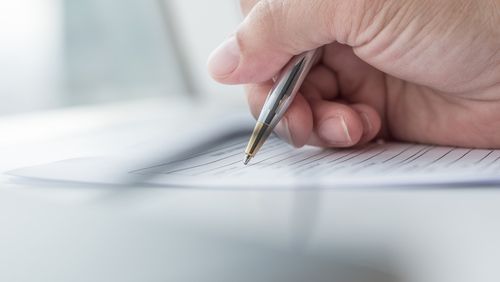Depositions are part of the information collected prior to a lawsuit. Usually, during the pre-trial discovery, the attorney to one of the parties takes sworn testimony from witnesses or from expert witnesses. Discovery is the formal investigation where all parties in the lawsuit find out more about the case. Attorneys use it to create a strategy to defend their side of the case in court. It can also help both sides reach an agreeable settlement without the need to go to trial.
Who Requests the Depositions?
The two sides of a lawsuit include the plaintiff, who is the person filing the lawsuit, and the defendant, the person they are suing. Either side can “depose” the other side, meaning they make a legal demand for their sworn testimony. Most often, the defendant’s attorney deposes the plaintiff. This is almost always the case involving a personal injury case for a car accident.
Although laws regarding depositions vary somewhat from state to state, people involved in a lawsuit are usually required to participate whenever the other side requests it. Since a deposition is considered sworn testimony, you are expected to answer each question and tell the truth. You swear an oath to give honest answers to the questions the attorney asks.
Again, there are some exceptions to the rule depending on the state where the deposition is conducted. For example, if the question involves privileged or irrelevant information, you might be permitted not to answer. Sometimes people take the 5th amendment, even in civil cases. Witnesses “plead the 5th” to invoke their right against self-incrimination.
The deponent (the person being questioned) has the right to have their attorney present. However, the attorney conducting the process generally has the right to ask broader questions than they would in court.

What to Expect at a Deposition
A deposition takes place outside of the courtroom prior to the trial. You might go to the attorney’s office who is requesting the testimony. Sometimes the process takes place in the court reporter’s office or almost any other location. The requesting attorney usually asks the questions while a court reporter is present to transcribe the witness’ responses. Sometimes they videotape the events, especially if a witness won’t be able to testify in court.
A deposition might last only fifteen or twenty minutes, or it might go on for a week or longer. The more witnesses there are, the lengthier the process will be.
The attorney will inform you of the rules before the deposition begins. Specifically, they will instruct you to give clear verbal answers. You can’t shake your head in lieu of a verbal response. This ensures the court reporter records every word of testimony accurately.
What Kinds of Questions Do Attorneys Ask?
You should expect to answer a lot of questions as the deponent. These include questions about your name, address, and names of your immediate family members. The attorney might ask you if you’ve taken any medications that day.
Attorneys can ask broader questions at the deposition than they usually do at trial. They will ask questions about events leading up to the event and circumstances surrounding them. For example, if you are the defendant in a car accident case, the attorney might ask where you were going when the accident occurred. They might also ask what other activities you were engaged in while driving or your reason for going to your destination. The attorney will look for evidence that you were distracted, in a hurry, and possibly at-fault for the wreck.
When you sue someone for your injuries and related medical costs, they want to disprove your claim. The defense counsel will obtain and review all of your medical records including those previous to the accident. If you had previous conditions related to the injury in question, they will use your medical records to disprove your claim.
If you request compensation for lost wages, the attorney will ask about your current job and your job history. They will want specific information about your job duties, income, and how your injury kept you from working.
If you can’t answer a question precisely, say so. Don’t make a guess or just grab something out of thin air.
Depositions aren’t fun for anyone. You might have to answer questions that seem personal and unrelated to the event. Make every effort to stay calm, polite, and as cooperative as possible. Answer questions as precisely as possible and ask for clarification if you aren’t sure what they’re asking. Otherwise, the opposing counsel might contact the judge for assistance. When the judge gets involved at this early stage of the lawsuit, it can build prejudice against you.
If you think the opposing counsel’s question is irrelevant or privileged, you have the right to object and refuse to answer. Remember, there aren’t any judges present during the deposition to rule on your objections. This is one reason that although you don’t have to have your attorney present, it’s always a good idea. Your attorney knows your rights. They’ll guide you on when it’s within your rights not to answer.
Deposing the Defendant
The deposition isn’t just a tool for the side of the questioning attorney. It’s also your chance to speak to the defendant and learn more about what led to the accident. It also tells your attorney what kind of witness the defendant will make at trial.
Gather basic information about the defendant including their name and address. Confirm that they were the one responsible for the accident. If the deposition is about a car accident, confirm that the person was actually the one behind the wheel when the wreck occurred. Also, find out who owns the vehicle they were driving.
You can ask the defendant for complete details about how they witnessed the accident. You can also find out their version of what caused it. You might learn details that indicate they were reckless, distracted, or under the influence. Where were they going, and was there a sense of urgency about getting to their destination?
If there were any witnesses to the event, you should depose them as well. This includes passersby who witnessed the accident, medical providers, and any expert witnesses who will testify during the trial.
What Happens After the Deposition?
Sometime after the deposition ends, the court reporter will provide a transcription of the process and supporting documents to both sides. Both the plaintiff and the defendant receive the same information.
Generally, the deposition serves two purposes. First, it reveals what the person knows about the accident in their own words. It provides everyone in the case with all of the information related to the case. This way, there aren’t any surprises once the witness takes the stand in court. It shows attorneys on both sides the areas of weakness and strength in their cases. They still have time to use the information from the deposition to build a case that avoids or rebuts any problem areas.
Second, it preserves the witness’ testimony. A witness can change their testimony later on, but the attorneys will note it at trial. If a significant amount of time passes between the deposition and the trial, it’s easy to forget details of your testimony. It isn’t that the information is not important, it’s just that people tend to forget things. Witnesses come across as more believable when they get it right the first time. Some tips for keeping it simple and memorable include:
- Limit the number of “I don’t know” responses as much as possible. Save this answer for those questions you really know nothing about. We’ve all seen political hearings on TV where the witness couldn’t seem to recall what they had for breakfast that morning or lunch an hour ago. It looked like they didn’t want to give an honest answer. It will look the same if you answer with an “I don’t know” more than you need to.
- Don’t rush to answer the question. Listen to the entire question and make sure you understand it. If you don’t, ask for clarification. For example, if the attorney uses a pronoun such as “he” or “she”, you might infer they are asking about one person when they really mean someone else. Ask who the person is before attempting to answer.
- Don’t make guesses or estimates. If the attorney asks you the sum of two plus two, the answer is a definitive “four.” If they ask how fast the other driver was traveling when they struck your car, don’t give an answer. Chances are, they are trying to make it sound like you’re not giving honest, straightforward answers.
- Don’t answer questions about the other person’s motives for doing or not doing something. This is speculation and it has no value in court or in your deposition.
- Don’t respond to statements. Sometimes attorneys use emotional statements to provoke a response from you.
- Talk with your attorney prior to the deposition about what is and isn’t privileged information. Although your attorney will be there with you, they might get distracted and fail to intervene. It’s easier if you know beforehand. If you aren’t sure whether you should answer a question, ask to speak privately with your attorney before continuing.
- Count to five before answering any question other than “what’s your name?” This helps give you time to run the question through your mind and formulate the best answer. Take as much time as you need to give the best answer to every question.
- Don’t respond to anything the attorney says or asks outside of the deposition. Some attorneys will approach you during breaks or in the restroom to persuade you to change your testimony. Your attorney is on your side. The other attorney is interested in doing what’s best for his client or the insurance company.

Dealing with the Insurance Company
Sometimes the defendant’s car insurance company provides the legal defense when their client gets sued. All auto insurance policies include terms about providing a lawyer for their clients who get sued for damages in a car accident. This is called their “duty to defend.” Under some circumstances, the insurance company doesn’t provide a lawyer.
Insurance companies have a lot to gain from providing their clients with a good defense. They have a long list of tactics they use to try and pay as little as possible. They don’t save these tactics for the courtroom. Some things to watch out for during the deposition include:
Attorneys acting nice and friendly
No matter how nice they seem, the attorney is representing the other side of the lawsuit. Often, it’s a strategy used to disarm witnesses and make them want to respond in a similar way. Don’t allow yourself to get drawn into lengthy conversations or to volunteer more information than you’re asked for.
Putting long breaks between the previous answer and the next question
The intention of the attorney isn’t to formulate the next question. They already know what they’re going to ask you next. They want to create an uncomfortable silence that you need to fill. The attorney knows that if you start “filling in the gaps,” they will get more voluntary information from you.
Responding negatively to your testimony
Acting shocked or unbelieving in response to your answer can put you on the defensive. You might feel like you need to elaborate on your reply. This means giving more information to make your answer clearer.
Asking the same question over and over
It might appear that the attorney has a terrible memory and can’t remember the questions they’ve already asked and you’ve answered. In reality, it is a tactic to agitate the witness. You might add more information to the answer with the hope of finally moving on. Instead, it opens up a new line of questioning and further agitates you. Just adding to the time it takes to make the deposition can put you off your guard.
The Importance of Depositions
Depositions are important to both parties in a lawsuit. They give you the information you and your attorney need to prepare for court. It’s also an opportunity for attorneys to test their skills on you. Whether the other party has a personal attorney or one who represents their insurance company, their goal is the same. The more they can learn about your potential contribution to the accident, the less they will have to pay.
You aren’t required to have a personal injury attorney with you during depositions. But an experienced attorney knows the laws and how they apply to your case. If you’ve received a request for deposition, don’t risk providing the other side of the case with information they can use against you. Contact the Law Firm of Batta Fulkerson and schedule a consultation. Make sure you’re prepared when you take the oath and tell your side of the story.




